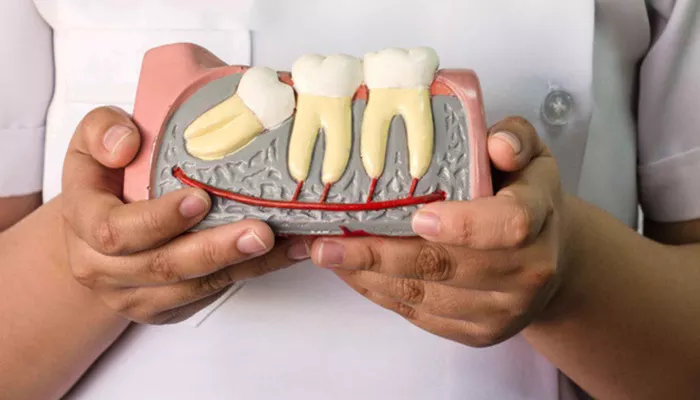Wisdom teeth, also known as third molars, are the last set of teeth to emerge in the mouth, typically during late adolescence or early adulthood. While wisdom teeth can be a valuable asset to the dental arch, they are also prone to various complications, including fractures.
Wisdom tooth fractures can be painful, lead to further dental issues, and may require immediate attention from a dental professional.
In this article, we will explore the common causes of wisdom tooth fractures, the potential consequences, and steps you can take to prevent these occurrences. By understanding the factors that contribute to wisdom tooth fractures, you can take proactive measures to maintain your oral health and avoid the discomfort and complications associated with this condition.
What Is A Wisdom Tooth Fracture?
A wisdom tooth fracture occurs when a crack or break appears in the tooth structure, either partially or completely. This can happen due to various reasons, such as:
Excessive Biting Force: Chewing on hard or crunchy foods can exert excessive pressure on the wisdom teeth, leading to fractures.
Dental Trauma: Injuries to the face or mouth, such as a blow to the chin or a fall, can cause wisdom teeth to crack or break.
Weakened Tooth Structure: Factors like tooth decay, large fillings, or previous dental work can weaken the integrity of the tooth, making it more susceptible to fractures.
Causes of Wisdom Tooth Fractures
1. Impaction
Wisdom teeth are often impacted, meaning they are trapped or unable to fully emerge from the gums due to lack of space in the mouth.
Impacted wisdom teeth are more prone to fractures because they are under constant pressure from the surrounding teeth and gums.
2. Tooth Decay
Untreated tooth decay can significantly weaken the tooth structure, making it more likely to fracture. If a wisdom tooth has a large cavity or extensive decay, it is at a higher risk of cracking or breaking.
SEE ALSO: When Does the Blood Clot Form?
3. Grinding and Clenching
Bruxism, or the habit of grinding or clenching the teeth, can put excessive pressure on the wisdom teeth, leading to fractures over time.
This is especially true if the grinding occurs during sleep, as it is difficult to control.
4. Inadequate Oral Hygiene
Poor oral hygiene can contribute to the development of tooth decay and gum disease, both of which can weaken the teeth and make them more susceptible to fractures.
Consequences of Wisdom Tooth Fractures
Wisdom tooth fractures can have several consequences, including:
Pain and Discomfort: A fractured wisdom tooth can cause significant pain, especially when biting down or when the area is touched.
Infection: If the fracture extends below the gum line or allows bacteria to enter the tooth, it can lead to infection, which may require antibiotics or further dental treatment.
Difficulty Eating: Depending on the severity of the fracture, it may be difficult or painful to chew on that side of the mouth, which can affect your diet and overall nutrition.
Damage to Adjacent Teeth: If a fractured wisdom tooth is left untreated, it can potentially cause damage to the neighboring teeth, such as cracks or chips.
Prevention And Treatment
To prevent wisdom tooth fractures and maintain good oral health, it is essential to:
Practice Good Oral Hygiene: Brush your teeth twice a day with a soft-bristled toothbrush and fluoride toothpaste. Floss daily to remove plaque and food debris from between teeth.
Avoid Hard or Crunchy Foods: Be cautious when eating hard or crunchy foods, especially if you have wisdom teeth. Cut these foods into smaller pieces or avoid them altogether.
Manage Bruxism: If you grind or clench your teeth, talk to your dentist about treatment options, such as a custom-made nightguard or other therapies to reduce the pressure on your teeth.
Regular Dental Check-ups: Visit your dentist regularly for professional cleanings and exams. Your dentist can detect and treat any issues with your wisdom teeth before they become more serious.
If you suspect a wisdom tooth fracture, it is essential to seek prompt dental attention. Your dentist can assess the extent of the damage and recommend the appropriate treatment, which may include:
Fillings: For minor fractures that do not extend below the gum line, your dentist may be able to repair the tooth with a filling.
Root Canal Treatment: If the fracture reaches the pulp (inner layer) of the tooth, a root canal may be necessary to remove the infected or inflamed pulp and restore the tooth.
Tooth Extraction: In some cases, if the fracture is severe or the tooth cannot be repaired, your dentist may recommend extracting the wisdom tooth to prevent further complications.
Conclusion
Wisdom tooth fractures can be a painful and inconvenient experience, but with proper prevention and early treatment, you can maintain good oral health and avoid complications. By practicing good oral hygiene, being mindful of your diet, managing bruxism, and visiting your dentist regularly, you can significantly reduce your risk of wisdom tooth fractures. If you experience any pain, discomfort, or signs of a fractured wisdom tooth, do not hesitate to contact your dentist for a prompt evaluation and treatment.

